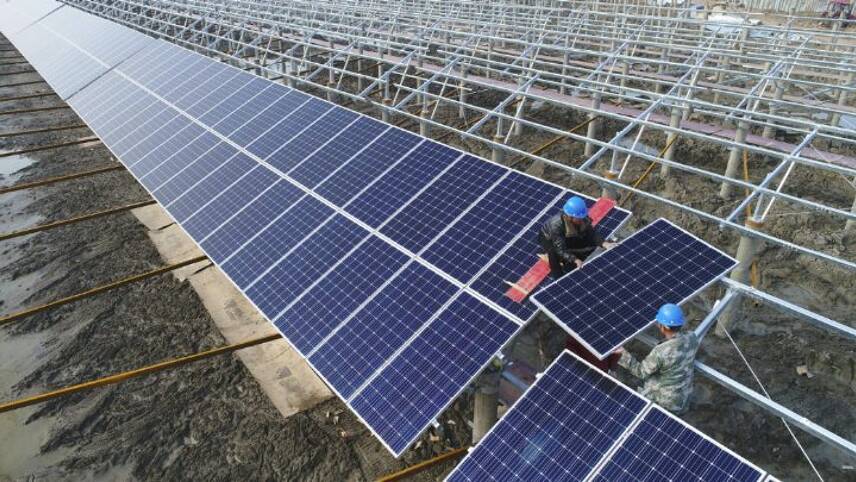Register for free and continue reading
Join our growing army of changemakers and get unlimited access to our premium content

Pictured: Solar panel installation workers in China
Published today (29 March), IRENA’s 2022 edition of the World Energy Transitions Outlook outlines the priority actions that will need to be taken between now and 2030 to keep the goal of limiting the global temperature increase to 1.5C within reach.
COP26 President Alok Sharma stated earlier this month, in a journal for think-tank IPPR, that the goal to “keep 1.5C alive” was not guaranteed in the long-term by the Glasgow Climate Pact alone. He described the Pact as a “fragile win”. His article warned that “achievements will come to nothing” unless “promises made are promises kept”.
IRENA echoes this warning but puts it in far stronger terms. The Agency’s director-general Francesco La Camera summarized the report’s inclusions by saying: “The energy transition is far from being on track and anything short of radical action in the coming years will diminish, even eliminate chances to meet our climate goals.”
According to the report, keeping the world on a 1.5C pathway will require ensuring that renewables account for at least 40% of the global annual energy mix in 2030, up from 14% at present. This shift could be delivered by a “resolute” phase-out of coal, compounded by rapid expansion of wind, solar and sustainably-sourced biomass. Unabated coal generation would end globally by 2030.
Electrification will also need to happen at scale to tackle energy consumption – the Outlook is predicated on the global electric vehicle (EV) stock being 20 times larger in 2030 than it was in 2021. Also detailed is the widespread uptake of electric technologies for domestic heating.
Additionally, the report highlights historic under-investment in energy efficiency. Global energy efficiency investment was $0.3trn in 2021 but will need to reach $1.5trn annually. This finding was to be expected; the International Energy Agency has stated that the rate of progress on energy efficiency will need to at least double from 2021 levels to deliver a net-zero world.
Under the energy transition scenario set out in the Outlook, global energy-related emissions fall by almost 30% this decade.
Money talks
The overall price tag which the Outlook assigns to the energy transition scenario is $5.7trn annually through to 2030. It states that $0.7trn could be redirected by public finance each year from fossil fuels. The majority of the remaining investment will need to come from the private sector, IRENA argues, stating that the role of governments is mainly to create an enabling policy environment.
While this may seem a steep price to pay, the Outlook outlines that gains would outweigh losses in terms of climate risk costs avoided in the long term. Moreover, more countries set to see socio-economic benefits on the energy transition pathway detailed than in the business-as-usual pathway. It touts the creation of 85 million jobs, compared with the loss of 12 million fossil fuel jobs, this decade. It argues that a just transition approach, at international, national, sector and specific corporate levels, will be needed.
With these long-term climate, social and economic benefits in mind, the Outlook compels world leaders not to be tempted to increase domestic fossil fuel production as a means for greater energy independence in light of Russia’s war in Ukraine.
The UK Government is preparing to publish an energy security strategy that is expected to encourage more North Sea oil and gas production, for example, alongside more onshore wind and more nuclear.
Elsewhere, key oil and gas exporters like the UAE, Saudi Arabia and the US are poised to potentially increase production and exports as more importers outline plans to reduce their reliance on Russia.
IRENA’s La Camera said: “Today, governments are facing multiple challenges of energy security, economic recovery and the affordability of energy bills for households and businesses. Many answers lie in the accelerated transition. But it’s a political choice to put policies in place that comply with Paris Agreement and the Sustainable Development Agenda.
“Investing in new fossil fuel infrastructure will only lock in uneconomic practices, perpetuate existing risks and increase the threats of climate change.
“0% of the global population lives in countries that are net importers of fossil fuels. By contrast, renewables are available in all countries, offering a way out of import dependency and allowing countries to decouple economies from the costs of fossil fuels while driving economic growth and new jobs.”
UN Secretary-General Antonio Gutteres has previously stated that the rush to increase fossil fuel production due to Russia’s war in Ukraine is “madness” and will jeapordise the delivery of key climate targets, thereby storing up huge socio-economic risks for the future.
Sarah George


Please login or Register to leave a comment.